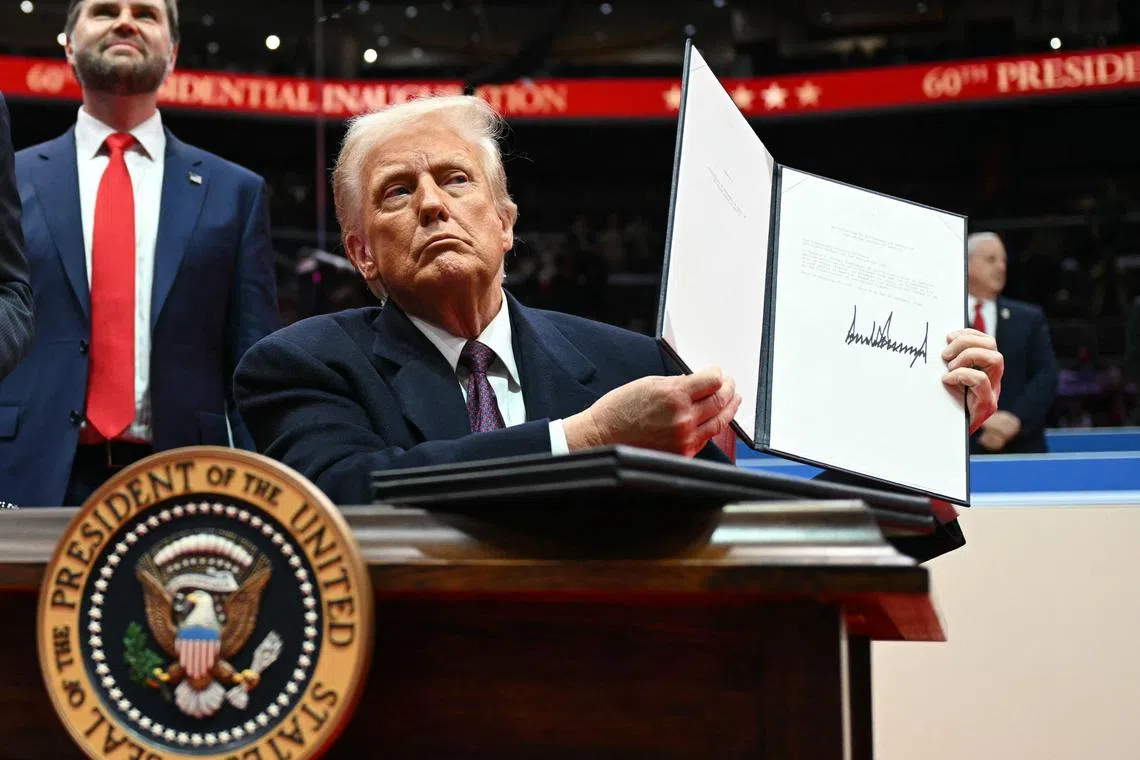Trump’s anti-climate action steps a setback for the world and especially the US: Experts
Sign up now: Get ST's newsletters delivered to your inbox

US President Donald Trump with a letter to the UN withdrawing the US from the Paris Agreement during the inaugural parade on Jan 20.
PHOTO: AFP
SINGAPORE – US President Donald Trump launched multiple fronts in his anti-climate action campaign on Jan 21 by announcing his country’s withdrawal from the United Nations Paris Agreement
But while Mr Trump regards fossil fuels as key to the nation’s prosperity and lower energy prices
Worse, doubling down on fossil fuels will create more deadly air pollution at home and cause more greenhouse gas pollution, fuelling climate change.
Globally, the effects of climate change – such as wildfires and more intense storms – are worsening, with 2024 having been the hottest year on record
The 10 hottest years since 1850 have occurred in the past decade, according to the US’ National Oceanic and Atmospheric Administration.
And the US has been hit hard by extreme weather events. Wildfires exacerbated by climate change devastated Los Angeles recently
The Paris Agreement is the UN’s main pact to fight climate change. Mr Trump exited the pact during his first presidential term. It will take about a year for the latest withdrawal to take effect.
“I am immediately withdrawing from the unfair, one-sided Paris climate accord rip-off,” he said to cheering supporters at a Washington sports arena after being sworn in.
“The United States will not sabotage our own industries while China pollutes with impunity,” he said, referring to the world’s top greenhouse polluter.
But China is also the world’s top investor in renewable energy and top exporter of green technology
The expected withdrawal is unlikely to derail global climate action, which has become more urgent as the planet keeps breaking heat records, but also because of global pledges to triple renewable energy generation by 2030. However, the decision is still damaging.
“The US withdrawing from the Paris Agreement is unfortunate, but multilateral climate action has proven resilient and is stronger than any single country’s politics and policies,” said Ms Laurence Tubiana, a key architect of the accord and chief executive of the European Climate Foundation.
UN climate chief Simon Stiell said Mr Trump’s anti-green stance was an own goal.
“Embracing (the global clean energy boom) will mean massive profits, millions of manufacturing jobs and clean air.
“Ignoring it only sends all that vast wealth to competitor economies, while climate disasters like droughts, wildfires and superstorms keep getting worse, destroying property and businesses, hitting nationwide food production, and driving economy-wide price inflation.”
It is a view shared by Mr Ani Dasgupta, chief executive of the Washington-based World Resources Institute think-tank.
“It simply makes no sense for the United States to voluntarily give up political influence and pass up opportunities to shape the exploding green energy market.
“Sitting on the sidelines also means the United States will have fewer levers to hold other major economies accountable for living up to their commitments.”
Still, the US exiting international climate negotiations will send a chill through the decades-old UN process.
“Globally, it undermines the collective fight against climate change at a time when unity and urgency are more critical than ever,” said Mr Harjeet Singh, a veteran climate activist and director of the Satat Sampada Climate Foundation, which is based in India.
Mr Trump also signed an order instructing federal agencies to reject international climate finance commitments made by the administration of former president Joe Biden.
“The second US withdrawal from the Paris Agreement is undoubtedly a major setback for climate multilateralism. The move will dampen global climate momentum while it has been suffering from headwinds in recent years,” said Mr Li Shuo, director of China Climate Hub at the Asia Society Policy Institute in Washington.
But if nations choose to go slow in the fight against global warming, they will miss the bigger trend beyond the culture wars on climate action.
“The economic story around decarbonisation is no longer a fantasy. One can make money while cutting emissions,” Mr Li told The Straits Times.
Mr Trump has vowed to roll back Mr Biden’s signature climate plan, the Inflation Reduction Act (IRA), which has unleashed billions of dollars in tax credits to support renewable energy generation, electric vehicle production and sales, carbon capture, biofuels and other green technologies.
It is unclear how successful Mr Trump will be in gutting all or parts of the IRA, especially since Republican states are the largest beneficiaries, particularly when it comes to job creation in manufacturing.
On Jan 21, he vowed to stop new wind power developments. “We are not going to do the wind thing,” he said, calling wind turbines ugly, expensive and harmful to wildlife.
He also revoked Mr Biden’s 2021 executive order that aimed to ensure half of all new vehicles sold in the US by 2030 were electric.
He has also said he intends to reverse other EV support measures. The Biden administration offered a subsidy of US$7,500 to consumers for new EV purchases. And Mr Biden’s government also imposed tougher tailpipe emissions standards on carmakers.
Mr Trump’s plan to ramp up exploration and production of oil and gas risks unleashing significant environmental damage and a spike in greenhouse gas emissions.
He declared a national energy emergency to accelerate permitting of oil, gas and power projects, saying this was key to making the US a rich nation again.
He also rolled back environmental protections and signed orders aimed at promoting oil and gas development in Alaska, reversing Mr Biden’s efforts to protect Arctic lands and US coastal waters from drilling.
“We will bring prices down, fill our strategic reserves up again right to the top and export American energy all over the world,” he added.
However, the US is already the world’s top oil and gas producer, and ramping up green energy was part of the Biden administration’s plan to reduce US dependence on volatile fossil fuel prices, cut pollution, boost jobs and create more sources of energy.
“By opening the floodgates of oil and gas projects, President Trump is setting the US back to the last century,” Mr Li said. “This is happening when the US is already a decade behind China in mastering critical low-carbon technologies.”
Mr Trump’s fossil fuel focus will only set back the country further, Mr Li added.
“The global climate story has been rewritten when China made its early bet on solar, wind and EVs while Washington engaged in climate politicking. This chapter now continues, and the winners and losers are evident.”
David Fogarty is deputy foreign editor at The Straits Times and senior climate writer. He also covers the environment, in areas ranging from biodiversity to plastic pollution.



